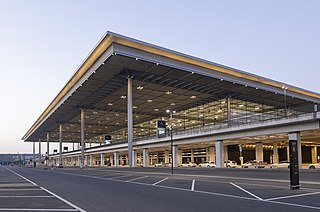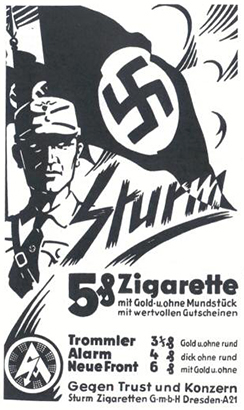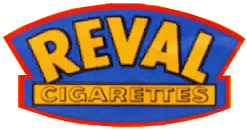
Berlin Brandenburg Airport Willy Brandt, , is an international airport in Schönefeld, just south of the German capital and state of Berlin, in the state of Brandenburg. Named after the former West Berlin mayor and West German chancellor Willy Brandt, it is located 18 kilometres (11 mi) south-east of the city centre and serves as a base for Eurowings, easyJet and Ryanair. It mostly has flights to European metropolitan and leisure destinations as well as a number of intercontinental services.
West is a German brand of cigarettes, currently owned and manufactured by Imperial Brands.

Haus Bergmann is a German brand of cigarettes, currently owned and manufactured by British American Tobacco. The name HB is derived from the name of the Dresdner cigarette factory Haus Bergmann, which was acquired by BAT in 1932.

Memphis is an Austrian brand of cigarettes, currently owned and manufactured by "Austria Tabak", which is owned by the Gallaher Group, a subsidiary of Japan Tobacco.
Tutunski kombinat Prilep is a tobacco company headquartered in Prilep, North Macedonia. The company mainly deals with the purchasing and selling of high-quality oriental tobacco ; its operations also include the production of cigarettes. The Prilep region is known for its production of quality oriental tobacco. Tobacco tradition in Prilep goes back to 1873 when R.O.T built the first warehouse for purchasing and processing tobacco. In 1930 the Croatian scientist Rudolf Gornik introduced the first varieties of famous oriental type Prilep and heralded the beginning of a golden tobacco era in Prilep. The then Government of Yugoslavia issued a special resolution in 1949 which established a state-owned Tobacco company in Prilep. The primary aims of this trading company were the purchasing and processing of tobacco. Soon Prilep's "gold" brought the first money in ex-Yugoslavia from abroad. Trade was established with United States, Japan, and companies in Europe. In 1955 the Tobacco company from Prilep opened its first cigarette factory.

The Sturm Cigarette Company was a cigarette company created by the Nazi Party's Sturmabteilung (SA). The sale of its cigarettes provided the SA with operating funds and a channel for political messaging. Coercion and violence were used to increase sales.

In Germany, smoking is widespread and is subject to very few and lax regulations compared to other countries in Europe. Tobacco taxes in Germany are among the lowest in Europe. Germany ranks last on the Tobacco Control Scale and has sometimes been referred to as the "smoker's paradise" of Europe. According to German addiction researcher Heino Stöver, Germany has "[...] more cigarette vending machines than any other country in the world."

Ernte 23 is a German brand of cigarettes, currently owned and manufactured by Reemtsma, a subsidiary of Imperial Tobacco. "Ernte" is German for "harvest".

Muratti is a brand of cigarettes, currently owned and manufactured by Philip Morris International. Several Muratti variants have been introduced over the years and were also sold as Ambassador, Ariston, Cabinet, Gentry, Iplic, Peer and Regent.

Atika was a German cigarette brand which was owned and manufactured by Reemtsma, a subsidiary of Imperial Tobacco. Production of cigarettes under the "Atika" brand was discontinued in 2016.
Cabinet is a German brand of cigarettes, currently owned and manufactured by Reemtsma, a subsidiary of Imperial Brands. It is mainly sold and found in the New states of Germany.

Juno was a German brand of cigarettes, owned and manufactured by Reemtsma, a subsidiary of Imperial Tobacco. The brand was discontinued in 2016.

Karo is a German brand of filterless cigarettes, currently owned and manufactured by Altria. Karo is the German word for "diamond".

R6 is a German brand of cigarettes, currently owned and manufactured by Reemtsma, a subsidiary of Imperial Brands.

Reval is a German brand of cigarettes, currently owned and manufactured by Reemtsma, subsidiary of Imperial Tobacco.
Roth-Händle is a former tobacco manufacturing company based in Lahr, Germany. The brand is now managed by Reemtsma, a subsidiary of Imperial Tobacco since 2002.
Senoussi was a German brand of cigarettes that was owned and manufactured by Reemtsma, a division of Imperial Tobacco. The brand was discontinued in 2002.
Club is a German brand of cigarettes, currently owned and manufactured by Japan Tobacco.

Transport System Bögl (TSB) is a maglev system for driverless trains developed by the German construction company Max Bögl since 2010. Its primary intended use is for short to medium distances and speeds up to 150 kilometres per hour (93 mph) for uses such as airport shuttles. The company has been doing test runs on an 820 metres (2,690 ft) long test track at their headquarters in Sengenthal, Upper Palatinate, Germany since 2012 clocking over 100,000 tests covering a distance of over 65,000 kilometres (40,000 mi) as of 2018.
Berlin Brandenburg Airport was originally planned to open in October 2011, five years after starting construction in 2006. However, the project encountered a series of successive delays due to poor construction planning, execution, management, and corruption. The Airport finally received its operational licence in May 2020, and opened for commercial traffic on 31 October 2020, 14 years after construction started and 29 years after official planning was begun. Schönefeld's refurbished passenger facilities were incorporated as Terminal 5 on 25 October 2020 while all other airlines completed the transition from Tegel to Berlin Brandenburg Airport by 8 November 2020.













